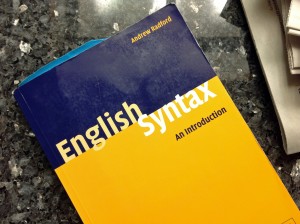The Right Template for the Job
The perfect pupil for a mentor/pupil relationship, if literary tradition is any indication, fits the following template: Male Well-meaning “Ordinary” looks And it doesn’t hurt… Read More »The Right Template for the Job
The perfect pupil for a mentor/pupil relationship, if literary tradition is any indication, fits the following template: Male Well-meaning “Ordinary” looks And it doesn’t hurt… Read More »The Right Template for the Job
We find one of the longest battles in English linguistic history in that simple, problematic word “ask.” You wouldn’t think that three small letters… Read More »When Someone Has an Axe to Grind
True story: “its” as a pronoun didn’t come around until Early Modern English. Up until the late sixteenth century, the 3rd-person gender-neutral possessive pronoun… Read More »When Resistance Really Is Futile
It’s a big, complicated word, “linguistics,” stuffed with technical concepts and broad theories. If writing is your craft, though, this particular study could well be… Read More »7 Things Every Writer Should Know about Linguistics
(Did it work? Do I have your attention?)
Beowulf is one of those works of literature that, quite honestly, never interested me. Some beefy warrior kills a monster, and then he kills another one, and there’s a dragon in there somewhere, and at the end (spoiler alert!), he dies. I maintained a scornful disinterest for this epic over the course of a decade, until my conversion in my mid-twenties. Here’s how it went down.
Objectives:
Skill level: Advanced
As indicated by the title, this is the final post in my verb series, though not necessarily my final post on verbs. (Who knows what the future holds, yeah?) This is mostly an overview post, so it’s short, quick, and to the point.
This post covers two essential constructs most commonly associated with the verb to be.
Objectives:
Skill Level: Intermediate
In English, the term “copula” (or “linking verb”) refers to a verb that links a subject and a subject predicate. (The subject predicate, as indicated by its name, takes a nominative case.) The copula serves as a sort of grammatical placeholder and holds little lexical meaning despite its grammatical and rhetorical purpose.

The discussion in this post requires a different view of language structure. For a deeper understanding, I refer you to Andrew Radford’s English Syntax: An Introduction (ISBN 0521542758), particularly pp. 190-193 . Much of this post draws from that source.
Objectives:
Skill level: Advanced
Read More »Verbs, Part 4: Theta-Roles, or How to Eliminate Passive Voice
This post covers verb transitivity and its relationship to the fourth verb feature, Voice.
Objectives:
Skill level: Intermediate
This post covers the verb features of Tense, Mood, and Aspect. It’s boring, and I’ve put off writing it forever because it’s boring.
Objectives:
Skill level: intermediate
“The past and the future walked into a bar. It was tense.”
As grammar jokes go, this one is fairly awful. (But I laugh all the same, of course, because my sense of humor apparently sprouted in one of our local corn fields.) Of the verb features, Tense is probably the easiest to understand. Mood, and Aspect were once these nebulous terms to me, conditions that I understood existed but that I couldn’t pinpoint or keep track of. A fourth verb feature, Voice, merits its own post and will be discussed only minimally here.